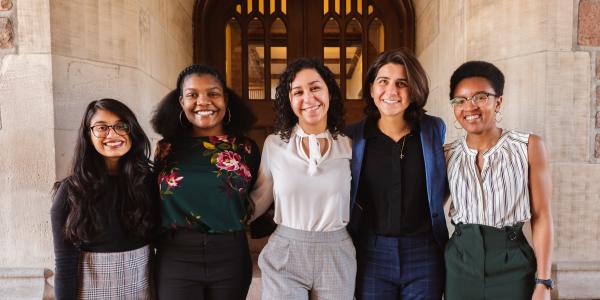The Mellon Mays Undergraduate Fellowship (MMUF) is pleased to welcome its 27th cohort of fellows. The fellows selected this spring represent a highly ambitious, celebrated group of students with varied interests. This two-year fellowship funds original undergraduate research projects in the humanities and social sciences that pertain to identity, social justice, and diversity. Students apply to the program as sophomores and work closely with a faculty mentor during the semester and the summers as they develop and conduct their research. During the fellowship, students also have the opportunity to participate in the annual Mellon Mays Research Symposium and to attend the annual MMUF Midwest regional conference.

The program is named after Benjamin Mays, a former Morehouse president educated at Bates College and the University of Chicago. WashU’s MMUF scholars carry on the legacy of Mays as scholars, leaders, and activists. The projects pursued by this year’s cohort are extraordinarily diverse in subject matter, making the MMUF seminar, led by program director Rafia Zafar, lively and engaging.
Wilmetta Toliver-Diallo, MMUF administrative coordinator, spoke to the experience of working with this year’s cohort: “What is exciting is watching students pursue inquiry for the sake of inquiry. It is exciting to hear them talk about the evolution of their projects and develop really meaningful relationships with faculty. It is wonderful to see the investment of our faculty in students. And I think it is most wonderful to be in a network of scholars, regionally and nationally, to exchange ideas, share best practices, and help prepare students to diversify the academy. I just returned from the Mellon Coordinator’s Conference (my first one). I was so fortunate to meet other coordinators but also to see my former undergraduate Dean who oversees a network of schools.”
Toliver-Diallo continued, speaking to the greater project of MMUF nationally, “The director of the foundation shared some information with us on the impact that Mellon Mays has made on campuses since it began 30 years ago. The program has contributed to the diversification of colleges and universities across the country – and that is its mission.”
Much of what is so valuable about MMUF is its ability to foster individualized inquiry. This year’s cohort certainly demonstrates this sentiment, with fellows embarking on projects that span a wide, multidisciplinary range of topics. Meet the new cohort below, and hear about their individual academic interests:

Antonia (Toni) Augilar Rosenthal
Majors: Classics & American Culture Studies
Project Title: The Devil Wears Dior: Cultural Appropriation in High Fashion and the American Cultural Construct of “Nativeness”
Project Description: My project seeks to analyze the appropriation of Native North American fashions, namely that of the eagle-feather war bonnet, in high fashion. I plan to examine the ways in which this appropriation enforces and builds colonial structures of oppression through re-historicizing the exploitation of Native North American fashions within changing American cultural constructions of “Native-ness” during three key periods: policies of “Indian Assimilation” of the late 19th century, the Hippie movement of the 1960s and 1970s, and John Galliano’s tenure at Dior. In doing so, I plan to gain a better understanding of what appropriation is, why it matters, and the continuing legacy of colonialism on Native communities.

Shayna Finkelstein
Major: International and Area Studies: Global Cultural Studies
Project Title: Race and Fascism in Authoritarian Governments
Project Description: My research focuses on race and fascism in Brazil’s military dictatorship and the German Nazi Party. In particular, I am trying to address how racial hierarchies are constructed and exercised during an authoritarian rule to create a dominant ruling party, using the Third Reich and Brazil as case studies. Additionally, I would like to examine how national socialist ideology influenced 1930s Brazil and how it skewed social conditions towards fascism in Brazil.

CeCe Heard
Major: English Literature
Project Title: Freedom of Quiet: Understanding the (In)authenticity of Black Women’s Intimacies
Project Description: Blackness has always been tied to resistance. In the current era, this resistance commonly manifests as performances of Blackness that are loud, unapologetic, and always having to do with race. My project aims to understand how the expression of Black women’s intimate selves – their private thoughts and desires – work for or against racial resistance, and the subsequent push for racial solidarity and acceptance. Through visual cultural analyses of media productions that exceed racial boundaries, my project explores how Black women’s intimacies become the place at which their racial authenticity is policed.

Cienna Townson
Major: Linguistics
Project Title: Who’s Laughing Now?: Characteristics and Implications of Mock White Voice in Black Stand-up
Project Description: My project will identify the linguistic characteristics of Mock White voice used by Black stand-up comedians. In addition to discerning the phonological, lexical, and morphosyntactic features of Mock White voice, my project will examine these performances through a sociocultural lens. Given the long history of using Black people as a source of entertainment, I plan to evaluate the ways in which Black stand-up comedians reconcile their dynamic, on-stage performances that mock White people with the fact that they perform for predominately White audiences.

Siddhi Vora
Major: Women, Gender, and Sexuality Studies
Project Title: Speaking Her Truths
Project Description: The Kutch district in the state of Gujarat in India is home to the various semi-nomadic and pastoral Kutchi people who speak the Kutchi language, a language with no written script. While most Kutchis are bi and trilingual, using modified versions of other languages, a large part of Kutchi heritage is connected to its oral history and folklore. I am interested in what groups are “allowed” to record the Kutchi history and make their way into formal histories. Who is rendered invisible in history and left out of the discourse? What are the entry points into this process for marginalized groups? Most importantly, I am interested in discovering the ways that marginalized women make a space for themselves, their truths, and their history.





